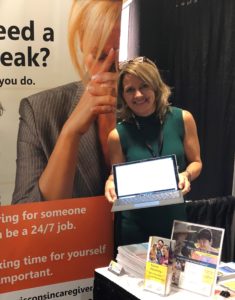Celebrating National Caregiver Month With The Arc Wisconsin
 Each November, we observe National Caregiver Month – honoring those who devote their lives to providing care for individuals with intellectual and developmental disabilities.
Each November, we observe National Caregiver Month – honoring those who devote their lives to providing care for individuals with intellectual and developmental disabilities.
The daily demands of caregiving for individuals with IDD and elderly adults can be challenging, and the commitment of time and resources that goes into ensuring a loved one’s well-being leaves little time for personal goals, professional duties and planning for the future.
At The Arc Wisconsin, Lisa Pugh is working hard to take a leadership role in the fight to support caregivers throughout the state.
One of the largest groups that make up the caregiving population are family members and loved ones. What is future planning and why is it important?
Future planning is creating a guide for a person with IDD to lead a good life as independently as possible. A plan is important throughout all stages of life, especially during transitions, and especially in the future after the parent or caregiver is no longer able to provide support.
About 2/3 of the more than 50,000 people with IDD in Wisconsin live with their families, and there are 16,500 vacant paid caregiver positions. In many of these families, the main caregivers are over age 60. When it comes to thinking about the future, Wisconsin families are like everyone else across the country- they don’t have a plan in place, even though they know they should.
Without a plan in place, those families can easily go into crisis. Many families feel overwhelmed, aren’t even aware of future planning options and resources, and need support to navigate the process.
Many families think future planning is mostly about finances – but good future planning is about so much more. It is about daily routines and future plans about where to live and work. It’s about growing people’s independence in their own decision-making. It really is a holistic look at someone’s life and how to secure and plan for their success and happiness.
What are you doing to meet this need?
We are working hard to expand access to future planning information. Trained planners help Wisconsin families work through common and difficult barriers. Since January 2018 we have trained 25 professionals who have supported more than 123 caregivers and families to begin development of a future plan. The Arc Wisconsin’s network of trained planners reached over 33 towns and cities.
We are also conducting outreach to identify systems barriers, advancing recommendations from a recent respite summit, and offering future planning workshops across the state.
You can learn more about our future planning efforts by watching this short video.
You were recently appointed co-chair of the Wisconsin Family and Caregiver Support Alliance. How can other chapters and organizations utilize coalition cooperation to better serve caregivers?
Caregiving as an issue that many populations are struggling with and many people are affected by. In our state, The Arc Wisconsin has chosen to work alongside aging and dementia advocacy groups to find solutions to support families. Our Alliance is tackling challenges in workgroups to address commonalities like lack of respite care, the need for caregiver support, complicated systems navigation, cultural competence and the need for employers to better support their caregiver employees. We are having success on all of these fronts by working together. In 2019, we plan to publish results of several surveys that we hope will lead to policy changes and perhaps redirected or new funding.
We will kick off this year’s Family Caregiver Month celebration with an Alliance press conference in the Governor’s Conference Room of our state capitol with storytelling by caregivers and presentation of a Governor’s proclamation.
What advice do you have for other chapters looking to expand their efforts in supporting caregivers?
Getting out and talking directly to caregivers has brought credibility to our efforts. Over the last year, The Arc Wisconsin has presented on future planning to groups of caregivers and professionals at Aging and Disability Resource Centers and at other events and conferences throughout the state. We have put on webinars, provided in-service training, and are widely distributing The Arc’s excellent future planning resources. Often communities are just starting to become aware of the fragile situations where elderly moms and dads have an adult son or daughter with IDD living at home while they continue providing most or all of the care. Future planning is essential in these situations and chapters of The Arc are poised to lead the way in tackling it.








